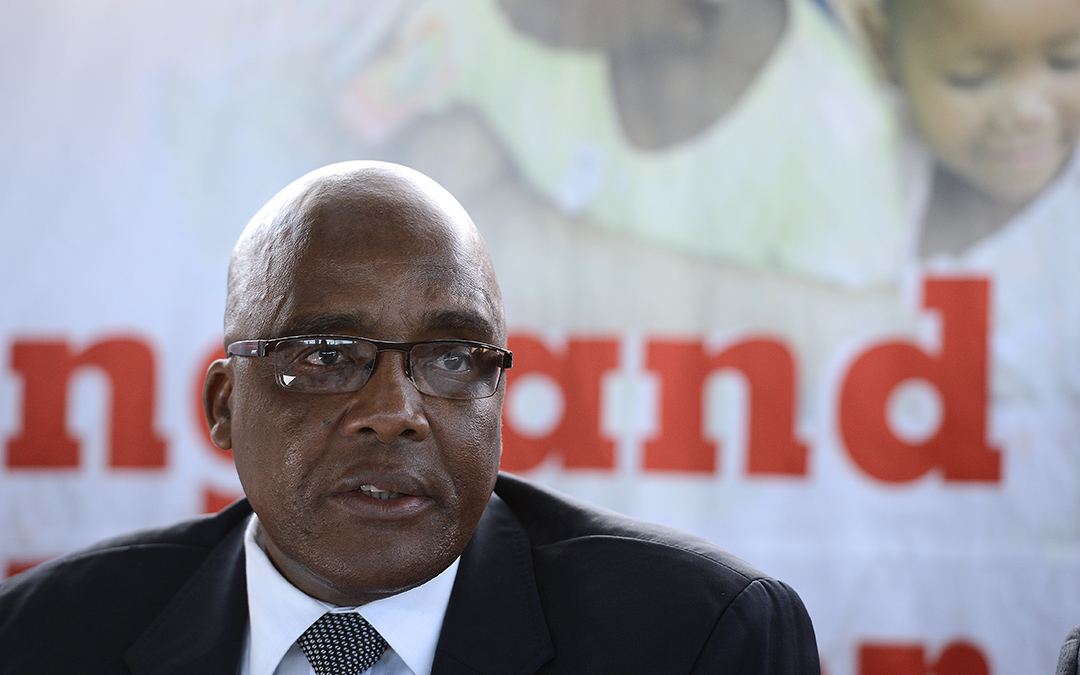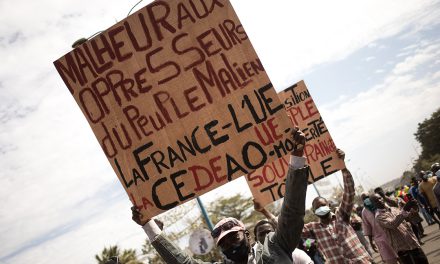Introduction
The Minister of Home Affairs, Aaron Motsoaledi, has every right to terminate the Zimbabwean Exemption Permit (ZEP) regime, as he did on 19 November 2021. The ZEP programme was initially set up as a demonstration of goodwill by the South African government to its neighbours fleeing the socio-economic crisis in Zimbabwe, which peaked in 2008.

South Africa’s Minister of Home Affairs Aaron Motsoaledi. Photo: STEPHANE DE SAKUTIN/AFP
It cannot be said that the South African government is in any way obliged to continue this programme in perpetuity. However, the government is obliged to justify its decision in terms of the requirements of administrative justice – that being procedural fairness, lawfulness and reasonableness. The government undoubtedly failed to do this, and for this reason, the Minister should reconsider his approach to the termination of the ZEP regime.
This argument is largely in line with the Helen Suzman Foundation’s (HSF) legal challenge to the Minister’s decision to (a) terminate the ZEP programme and (b) grant a 12-month extension for permit-holders to regularise their stay in terms of the Immigration Act. I agree with their argument that the Minister’s decision was administratively unfair.
No extension of ZEPs
Motsoaledi announced on 19 November 2021 that the ZEPs would not be extended, and the programme was set to expire a mere month later, on 31 December 2021. Holders were given a 12-month grace period to regularise their stay in terms of the Immigration Act. Recently, this was extended by another 6 months, until June 2023.
Legality of decision not to extend ZEPs
While it is indubitable that the Minister has the authority to terminate the ZEP programme, this authority is not unrestrained. In terms of section 31(2) of the Immigration Act, he is empowered to grant a category of foreigners a visa exemption for a specified period, and is similarly empowered to withdraw such an exemption if the Minister has determined that there is good cause. Whether there is good cause for such a decision is within the discretion of the Minister, but the South African Constitution requires that such a determination is objectively reasonable.[1]
The Minister’s decision constitutes administrative action, and so it must comply with the requirements of administrative justice.
Administrative Law
The Promotion of Administrative Justice Act 3 of 2000 (PAJA) sets out the requirements of administrative justice.
Procedural fairness
The procedural fairness element of administrative justice requires that those whose rights or legitimate expectations are materially and adversely affected by an administrative decision, must have the opportunity to be heard prior to the decision being taken.
In this case, procedural fairness comes into question concerning (a) the notice given and (b) the invitation for representations on the matter before the decision was made.
This decision not to extend the ZEPs would evidently have a grave and lasting impact on the rights and legitimate expectations of ZEP holders. Thus, PAJA[2] requires that before a decision is taken the administrator must give affected individuals adequate notice of the nature and purpose of the proposed administrative action, and a reasonable opportunity to make representations.
The Minister failed to do this. Notice of the decision was only given after the decision was taken, and a mere month before it came into effect. In the Director-General’s (DG) replying affidavit to the HSF’s legal challenge, the DG completely ignored the issue of PAJA’s notice requirements prior to a decision being taken, focusing exclusively on the separate requirements after a decision is taken. On 7 January 2022, the Department eventually allowed ZEP holders to make individual representations during the 12-month extension period, but no representations were allowed prior to the decision of termination being taken. In his replying affidavit, the DG referred to several public notices, but all of the notices he mentioned were published in January 2022 – two months after the decision of termination was already made, and one month after the decision had already come into effect.
The DG further argued that there was no “termination” of the programme, it simply expired and was not renewed. This is a weak argument. It was still an administrative decision – a decision to not renew – having a material and adverse effect on ZEP-holders’ rights. Moreover, after 12 years of continuous extensions of the programme, I believe that ZEP holders had a legitimate expectation that they would at least be consulted before a decision was taken not to extend the programme again, and given ample time to make representations before the decision was made.
Legitimate expectation is a legally justiciable element of administrative law – the expectation of a fair procedure being followed or of a certain outcome being afforded to a person. The expectation must have a reasonable basis, arising from an express promise given by an administrator or an administrator’s past practice. In this case, I believe that the past practice of continued extension over 12 years gave ZEP-holders a procedural legitimate expectation that they would be adequately and reasonably notified of the intention to end the programme well before the decision was actually made, as well as included in the decision-making process. As was stated by Justice Kate O’Regan in the Constitutional Court:
“Citizens are entitled to expect that government policy will ordinarily not be altered in ways which would threaten or harm their rights or legitimate expectations without their being given reasonable notice of the proposed change or an opportunity to make representations to the decision-maker.” [own emphasis added]
Furthermore, the decision affected the rights and legitimate expectations of the general public. It impacted national security, international relations, political, economic and financial matters, as was noted by the Minister himself in his January 2022 press statement on the issue. In the circumstances, the Minister also owed an obligation of procedural fairness to the public at large. PAJA[3] prescribes specific procedures to engage with civil society on the matter – notice and comment, a public inquiry, or some other justifiably fair procedure. No such procedure was adopted. The Regulations on Fair Administrative Procedures clearly lay out the comprehensive requirements for the publication of notices inviting participation in a proposed decision, and the DG’s reference to direct email correspondence with just two civil society organisations in no way met these requirements.
Reasonableness
PAJA also requires administrative decisions to be rational and reasonable. A reasonable decision must be both rational and proportional.
I argue that the Minister’s decision to terminate the ZEP programme is irrational, as there is no rational connection between his professed reasons for the decision and the actual impact that the decision would have.
One of the stated objectives of not extending the ZEPs was to reduce the budgetary and capacity constraints on the DHA. Firstly, the Department has not provided any evidence for their claim that they can no longer afford the programme. Secondly, I believe that terminating the permits would only increase pressure on the DHA, making it more vulnerable to abuse and corruption as ZEP-holders sought to find other ways to stay in South Africa legally.
The ZEP programme was initially introduced with the very intention of reducing existing pressure on the asylum and refugee regime. Ending the programme would have the opposite effect – it would lead to a sudden influx of ZEP holders attempting to apply for asylum, since most are unlikely to qualify for visas under the Immigration Act. Most ZEP holders also have a very slim chance of success in applying for asylum seeker status. Yet, South Africa’s asylum system is unique in that it provides asylum seeker permits with the right to remain in the country and move freely, pending the outcome of their asylum claim. So, even those who evidently would not qualify for refugee status can live and work in the country on an interim asylum seeker permit.
This makes it highly likely that many ZEP holders would apply for asylum despite lacking a valid claim to refugee status. The asylum system is already notoriously backlogged and subject to abuse by those without a legitimate asylum claim. Ending the ZEPs would thus further overburden and threaten the legitimacy of the asylum system and the DHA. Furthermore, there would be increased cost and capacity requirements for the Department for the inevitable arrest, detainment, and deportation of all ZEP-holders who will become undocumented but stay in the country.
In his replying affidavit in the HSF matter, the DG used the fact that the ZEP programme had not eased pressure on the asylum system as justification for why the ZEP programme could be terminated without affecting the asylum system. It is irrational to reason that since removing around 178 000 ZEP holders from the asylum system did not ease pressure on the struggling system, that inviting these ZEP holders into the system (by terminating their permits) would not burden the asylum system. Rather, this is evidence of the fact that the efficiency of the asylum system has not improved, despite the eased burden offered by the ZEP regime. The inevitable increase in asylum applications as Zimbabweans desperately try to stay in the country legally would only further encumber the system.
Furthermore, the decision concerning the grace period given after the decision was made was not proportional, and thus unreasonable. The 12-month grace period was not reasonably capable of alleviating the burden on the DHA, nor was it reasonably capable of affording ZEP holders sufficient time to regularise their status in terms of the Immigration Act. Backlogs in the visa and asylum systems are widely known. In 2019, the Supreme Court described the conditions at the DHA as one of “prolonged and enduring departmental dysfunction” and “sloth on a grand scale”, resulting in delays sometimes exceeding four years. This has been aggravated by the COVID-19 pandemic and the resultant suspension of DHA services during lockdowns. Recently, the Pretoria High Court ruled that the DHA had 30 days to process 182 permanent residence applications from immigrants, some of whom have been waiting seven years for their applications to be administered.
The government made no clear and comprehensive promise to prioritise ZEP holders’ claims above existing claims. There has been vague mention of a “Task Force” but with scant information on what this entails, it is impossible to determine whether the grace period could be deemed reasonable. Furthermore, the DG argued that since “only” 6000 ZEP-holders had made personal representations to the Minister since January, 12 months was clearly sufficient time. As demonstrated, the call for representations after the decision was already made was ingenuine and largely meaningless in terms of promoting input in the decision. The call for individual representations was also issued without the regulation-required clarity as to its purpose, or what exactly was required from ZEP holders.[4]
There may be very reasonable justifications for the termination of the ZEP regime as well as the grace period offered, but the Minister has not adequately demonstrated this to the public, as is required. As it stands, the decision is unreasonable.
Constitutional right to dignity
The decision to terminate the programme in this manner undermines the section 10 right to dignity of ZEP holders – a right to which all people in the country are entitled, not just citizens. In the seminal case of Minister of Home Affairs v Watchenuka, the Supreme Court of Appeal held that:
“Human dignity has no nationality. It is inherent in all people – citizens and non-citizens alike – simply because they are human. And while that person happens to be in this country – for whatever reason – it must be respected, and is protected, by s10 of the Bill of Rights.”
Terminating the ZEPs without adequate notice, consultation in the decision-making process, or adequate protection in the wake of the decision, fails to afford ZEP-holders the inherent value and worth to which they are entitled as members of South African society.
Conclusion
I do not argue for an indefinite extension of the ZEP programme. But, in South Africa’s constitutional dispensation, all exercises of public power must be constitutionally justifiable. An administrative decision of this nature needs to be proven to be procedurally fair and reasonable. The Minister’s decision did not meet these requirements.
[1] This is because, according to the South African Constitution, all exercises of public power are subject to review. Thus, such a determination which is unreasonable can be challenged in terms of PAJA as a mistake of fact.
[2] Section 3
[3] Section 4
[4] A comprehensive argument on this point can be found in the HSF’s replying affidavit at https://hsf.org.za/litigation/cases/hsf-minister-of-home-affairs-case-no-32323-2022/court-papers/hsfs-replying-affidavit.pdf
Helen Acton is a legal analyst at GGA. She holds a Bachelor’s degree in Politics and Philosophy, and an LLB from the University of Cape Town. She is interested in analysing political issues from a legal perspective. Constitutional and administrative law are her primary interests, especially the role they can play in promoting socio-economic equality and improving governance performance.







